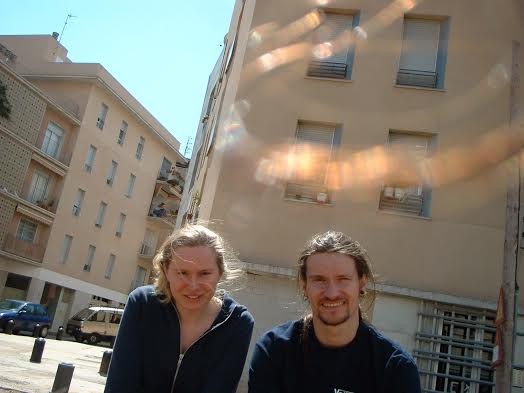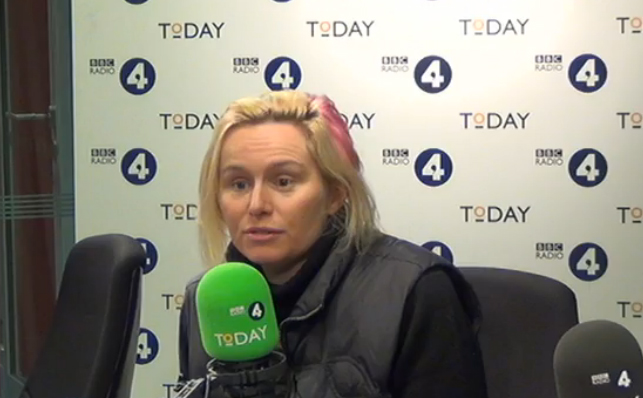[contextly_auto_sidebar]

Kate Wilson, with Mark Kennedy
In 2011, Kate Wilson was one of eight women who sued the Metropolitan Police after the women discovered that they had been deceived into long-term relationships with undercover police officers. At the High Court earlier this month, the police withdrew their defence in respect of Wilson’s claims for deceit, assault, misfeasance in public office and negligence. Despite that apparent victory, the women’s struggle for state accountability continues.
In withdrawing their defence, the police seemingly made a tactical decision not to contest the assertion that senior officers also had responsibility for the abusive relationships as a deliberate measure to avoid scrutiny. Consequently, despite succeeding in their court case and forcing the police to acknowledge that there has been a gross violation of their human rights, the women have been denied access to the documents which would reveal the true extent of the state’s intrusion into their lives.
‘The real motivation is to avoid disclosure at any cost,’ reckons Wilson. ‘Not only is this a huge personal blow as it is vital for me to get answers about the full extent of abuse that was inflicted upon me, but it is also very worrying in light of the upcoming undercover policing inquiry. It’s hard to believe that a police force that is going to such lengths to avoid scrutiny will genuinely participate in a robust public inquiry.’
The eight women are all social and environmental campaigners deceived into the relationships as a result of their political activity. Kate Wilson, who had a two-year relationship with Mark Kennedy, describes the reasons why they took their cases to the courts.
‘We had three main objectives,’ she tells the Justice Gap. ‘We wanted to make the police accountable for what they had done, to get answers and to make sure it never happened again to anyone else.’
Throughout the legal action the police used a series of aggressive tactics to avoid scrutiny. In 2013, they applied to transfer proceedings from open court to the secretive Investigatory Powers Tribunal. When this failed, the police applied to the court to strike out the women’s claim on the basis that they could ‘neither confirm nor deny’ the identity of undercover officers. The announcement of a public inquiry into undercover policing in 2014 – the Pitchford inquiry – forced the police to back down, stating that it was ‘now not proportionate or appropriate for the claims to be struck out’.
In an unexpected turn of events in November 2015, the police agreed an out-of-court settlement with seven of the women. The settlement resulted in an extraordinary public apology in which the force acknowledged that undercover officers ‘had entered into long-term intimate sexual relationships with women which were abusive, deceitful, manipulative and wrong’.
‘The apology was a huge political victory,’ says Wilson. ‘When we started the case we never thought that we would see the Deputy Assistant Commissioner of the Metropolitan Police publicly apologising for violating our human rights.’
‘It was an incredible retreat from the bullying position they had adopted up to that point,’ Wilson continues. ‘The clear admission by the police that these relationships should never have happened makes it much harder for them to carry out the abuse again. It also makes it easier for other affected women to bring claims in the future. When we first brought the case the lawyers didn’t even know what torts to use and the psychologists didn’t know how to start assessing the harm. Everyone said they had never seen anything like it before. Now these are known factors and hopefully the process will be easier for other claimants.’
Despite the apology – and more than four years after the claims had been issued – the police have failed to provide any documents evidencing the extent of the abuse. Wilson fought on to secure this disclosure. This month’s hearing in the High Court was due to clarify the timetable for disclosure in her case. Having exhausted all other means to avoid scrutiny, it appears that the police decided that they had no other option but to prematurely end proceedings, withdraw their defence and ask for judgment to be entered against them.
In an unprecedented move, the police went beyond the apology issued in November and accepted Wilson’s case that the actions of Mark Kennedy were ‘undertaken with the express or tacit knowledge of other police officers employed by [the Metropolitan Police]’. Supervising and managing officers knew that Mark Kennedy was ‘abusing the power that he was given as an undercover police officer’, and their failure to act on this knowledge was ‚unlawful and in abuse of their own duties as supervisors and managers of [Mark Kennedy’s] undercover activities’.
She argues that the failings of supervision and management claimed by the police also ‘raise questions about their ability to provide evidence of all the abuses committed, even if they were willing to fully cooperate’. ‘If there was a lack of adequate supervision, senior officers may not even be aware of the abuse committed by undercover officers,’ she says. ‘It is therefore imperative that the public inquiry publishes the cover names of the officers deployed in these political policing operations. This is essential to enable the people affected by the abuse to come forward and give evidence themselves.’
The police are presently resisting calls for the publication of undercover officers’ cover names as part of the Pitchford inquiry. They also continue to defend civil claims brought against them by other victims of undercover policing abuse and have failed to extend their apology to these individuals. It is clear that it will take significant public and political pressure to ensure that the inquiry results in the answers that the women are seeking. All eight woman are participating in the public inquiry in their ongoing fight for justice.







